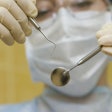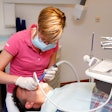
One of the best ways to prevent heart failure may be to keep up with daily toothbrushing. Frequent toothbrushing was linked to lower risks of atrial fibrillation and heart failure, according to a study published online December 1 in the European Journal of Preventive Cardiology.
Brushing teeth at least three times per day was linked to a 12% reduced risk of heart failure and a 10% lower risk of developing atrial fibrillation, according to the researchers. These results were independent of several variables, including age, gender, socioeconomic status, how often people exercised, drank alcohol, and other behaviors that can hurt the heart, like hypertension, they noted.
"Frequent toothbrushing (≥3 times per day) was negatively associated with risk of AF [atrial fibrillation] and HF [heart failure] occurrence," wrote the authors, led by Yoonkyung Chang, PhD, of Mokdong Hospital Neurology Department at the Ewha Womans University College of Medicine in South Korea.
The burden of atrial fibrillation, which is the most common type of cardiac arrhythmia, is increasing in Western and Asian populations due to the current aging population and the rise of associated risk factors and cardiovascular diseases. Previous research suggests that poor oral hygiene leads to bacteria in the blood, which causes inflammation. The risks of developing an irregular heartbeat and heart failure spikes as inflammation in the body increases. This study aimed to determine whether a connection existed between these two heart conditions and oral hygiene.
The study included about 161,000 people between the ages of 40 and 79 who had no histories of atrial fibrillation or heart failure and participated in the Korean National Health Insurance System. They underwent medical examinations and dental checkups between 2002 and 2003, and the researchers collected and analyzed information about the participants' height, weight, lab test results, medical conditions, lifestyle choices, and oral hygiene habits.
When checkups were completed about 10 years later, the researchers found that 4,911 of the participants developed atrial fibrillation, and 7,971 of them developed heart failure, the authors wrote.
Frequent toothbrushing, defined as at least three times per day, was significantly associated with attenuated risks of atrial fibrillation and heart failure.
Though the mechanisms behind the relationship between toothbrushing and the reduced risks of these heart conditions weren't investigated, the authors noted one potential reason for the connection. Frequent toothbrushing decreases bacteria in the subgingival biofilm, which prevents it from relocating to the bloodstream.
The authors pointed out that the large group of participants and the long period in which they were examined strengthens the findings. However, the study had some limitations. The researchers looked at only one country with an Asian population, so the study could not be generalized to all ethnicities. Also, there may be recall bias since the participants self-reported information, including the number of times they brushed their teeth and received professional cleanings.
These results, however, reaffirm the value of good oral health.
"Healthier oral hygiene by frequent toothbrushing and professional dental cleaning may reduce risk of atrial fibrillation and heart failure," the authors wrote.




















